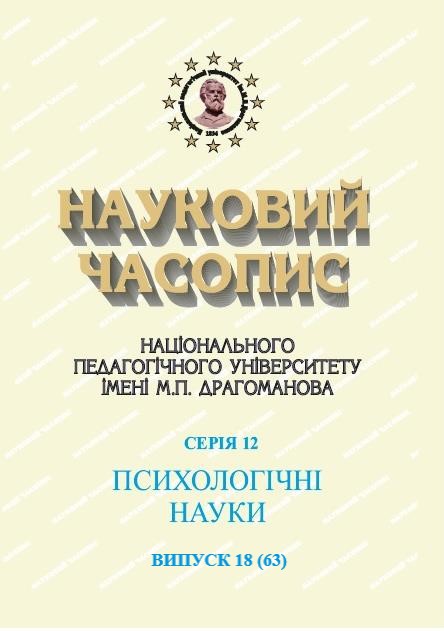THEORETICAL ANALYSIS OF THE RELATIONSHIP BETWEEN CONSPIRACY THEORY BELIEF AND PERSONALITY CONTROL LOCUS
DOI:
https://doi.org/10.31392/NPU-nc.series12.2021.18(63).01Keywords:
conspiracy theories, belief in conspiracy theory, locus of control, external, internal, personality.Abstract
The article highlights the results of a theoretical study of psychological and philosophical sources on the relationship between conspiracy theory belief and the locus of personality control. The phenomenon of conspiracy theory has been studied by the scientists from various fields of knowledge: philosophy, sociology, mathematics, history, political science. However, the conspiracy theory under the prism of psychological teachings has been studied mainly by foreign scientists. In particular, there is a number of works on the problem of conspiratorial thinking, patterns of conspiratorial worldview, emotional and cognitive aspects of belief in conspiracy theory of the individual and the relationship of this belief with political cynicism and disobedience to power; paranoid and schizotypal tendencies of personality. The article reveals the author’s vision of the concept of belief in the theory of conspiracy and its connection with the personality control locus. Belief in conspiracy theory is an integrated mental formation characterized by an individual’s belief in the truth of certain judgments or views that are the result of a secret plan of a group of influential people (elites) or organizations. This faith has several components, namely: a cognitive component, characterized by uncritical thinking, analysis and understanding of information; an emotional and motivational component that is characterized by the presence of fears, emotional sensitivity, activation of motives that motivate mystical teachings; a behavioral component that includes conformity of behavior, imitation of behavioral patterns of others, personal willingness to believe in conspiracy theories and mystical phenomena, dysthymic or stuck type of character accentuation. In our opinion, a person’s commitment to confessing conspiratorial views is connected with the locus of subjective control - a property of the individual, which is manifested in the tendency to seek a source of control over their life in the external environment, or to see it in themselves. Taken this into account, the article reveals the characteristic features of belief in the conspiracy theory of individuals with external and internal locus of control.
References
- Alieksieieva, Yu.A. (2014). Struktura ta iierarkhiia konstruktiv dukhovno-relihiinoi viry u yunatskomu vitsi [Structure and hierarchy of constructs of spiritual and religious faith in adolescence]. Aktualni problemy psykholohii: Zb. nauk. pr. Instytutu psykholohii
H.S. Kostiuka APN Ukrainy – Current problems of psychology: Coll. Science. etc. Institute of Psychology. G.S. Kostyuk, Academy of Pedagogical Sciences of Ukraine, 26, 21–33 [in Ukrainian]. - Vare, I.S. (2016). Subyektivnyy kontrol budushchikh psikhologov s vysokoy i nizkoy stepenyu sformirovannosti smyslozhiznennykh oriyentatsiy [Subjective control of future psychologists with a high and low degree of formation of meaningful life orientations]. Naukoviy oglyad – Science Review, 6(27), 71–79 [in Russian].
- Demchuk, O.A. (2016). Lokus kontrolyu v strukturi YA-kontseptsiyi osobystosti yak kohnityvna determinanta vyboru kopinh-stratehiy [The locus of control in the structure of the self-concept of personality as a cognitive determinant of the choice of coping strategies]. Naukovyi visnyk Khersonskoho derzhavnoho universytetu: Zbirnyk naukovykh prats. Seriia «Psykholohichni nauky» – Scientific Bulletin of Kherson State University: Collection of scientific works. Series “Psychological Sciences”, 2(1), 53–58 [in Ukrainian].
- Moskalets, V.P. (2004). Psykholohiya relihiyi [Psychology of religion]. Kyiv : Akademvydav [in Ukrainian].
- Petrushenko, V.L. (1989). Vera v dukhovnom mire lichnosti [Faith in the spiritual world of the individual]. Lvіv : Vyshaya shkola [in Russian].
- Stavytska, S.O. (2011). Dukhovna samosvidomist osobystosti: stanovlennya i rozvytok v yunatskomu vitsi [Spiritual self-consciousness of the individual: formation and development in adolescence]. Kyiv : NPU im. M.P. Drahomanova [in Ukrainian].
- Abalakina-Paap, M., Stephan, W.G., Craig, T., & Gregory, W.L. (1999). Beliefs in conspiracies. Political Paychology, 20(3), 637–647.
- Bieberstein, von J.R. (2008). Der Mythos von der Verschwörung: Philosophen, Freimaurer, Juden, Liberale und Sozialisten als Verschwörer gegen die Sozialordnung. Wiesbaden : Marix Verlag ein Imprint von Verlagshaus Römerweg.
- Brotherton, R. (2017). Suspicious Minds: Why We Believe Conspiracy Theories. New York : Bloomsbury Sigma.
- Bruder, M., Haffke, P., Neave, N., Nouripanah, N., & Imhoff, R. (2013). Measuring individual differences in generic beliefs in conspiracy theories across cultures: Conspiracy Mentality Questionnaire. Frontiers in Personality Science and Individual Differences, 4(297), 1–15. https://doi.org/10.3389/fpsyg.2013.00225
- Douglas, K.M., & Sutton, R.M. (2011). Does it take one to know one? Endorsement of conspiracy theories is influenced by personal willingness to conspire. British Journal of Social Psychology, 50(3), 544–552. https://doi.org/10.1111/j.2044-8309.2010.02018.x
- Hofstadter, R. (1964). The Paranoid Style in American Politics. Harper’s Magazine. Retrieved from https://harpers.org/archive/1964/11/the-paranoid-style-in-american-politics/#
- Kahan, D.M., Braman, D., Slovic, P., Gastil, J., & Cohen, G.L. (2008). The future of nanotechnology risk perceptions. Retrieved from https://scholarship.law.
edu/cgi/viewcontent.cgi?article=1285&context=faculty_publications - Lobato, E., Mendoza, J., Sims, V., & Chin, M. (2014). Examining the relationship between conspiracy theories, paranormal beliefs, and pseudoscience acceptance among a university population. Applied Cognitive Psychology, 28(5), 617–625. https://doi.org/10.1002/acp.3042
- Parsons, S., Simmons, W., Shinhoster, F., & Kilburn, J. (1999). A test of the grapevine: An empirical examination of conspiracy theories among African Americans. Sociological Spectrum, 19(2), 201–222.
- Pipes, (1997). Conspiracy: How the Paranoid Style Flourishes and Where It Comes From. New York : Free Press.
- Popper, K., (1966). The Open Society and its Enemies. Princeton : Princeton University Press.
- Rotter, J. B. (1966). Generalized expectancies for internal versus external control of reinforlement. Monographs, 80, 11–28.
- Swami, V., Chamorro-Premuzic, T., & Furnham, A. (2010), Unanswered questions: A preliminary investigation personality and individual difference predictors of conspiracist beliefs. Applied Cognitive Paychology, 24, 749–761. https://doi.org/10.1002/acp.1583
- Swami, V., Pietschnig, J., Tran, U.S., Nader, I.W., Stieger, S., & Voracek, M. (2013). Lunar lies: The impact of informational framing and individual differences in shaping conspiracist beliefs about the moon landings. Applied Cognitive Psychology, 27(1), 71–80. https://doi.org/10.1002/acp.2873
- Van Horn, Ch.K. (2010). The Paranoid Style in an Age of Suspicion: Conspiracy Thinking and Official Rhetoric in Contemporary America. Atlanta : Georgia State University. https://doi.org/10.57709/1666018

